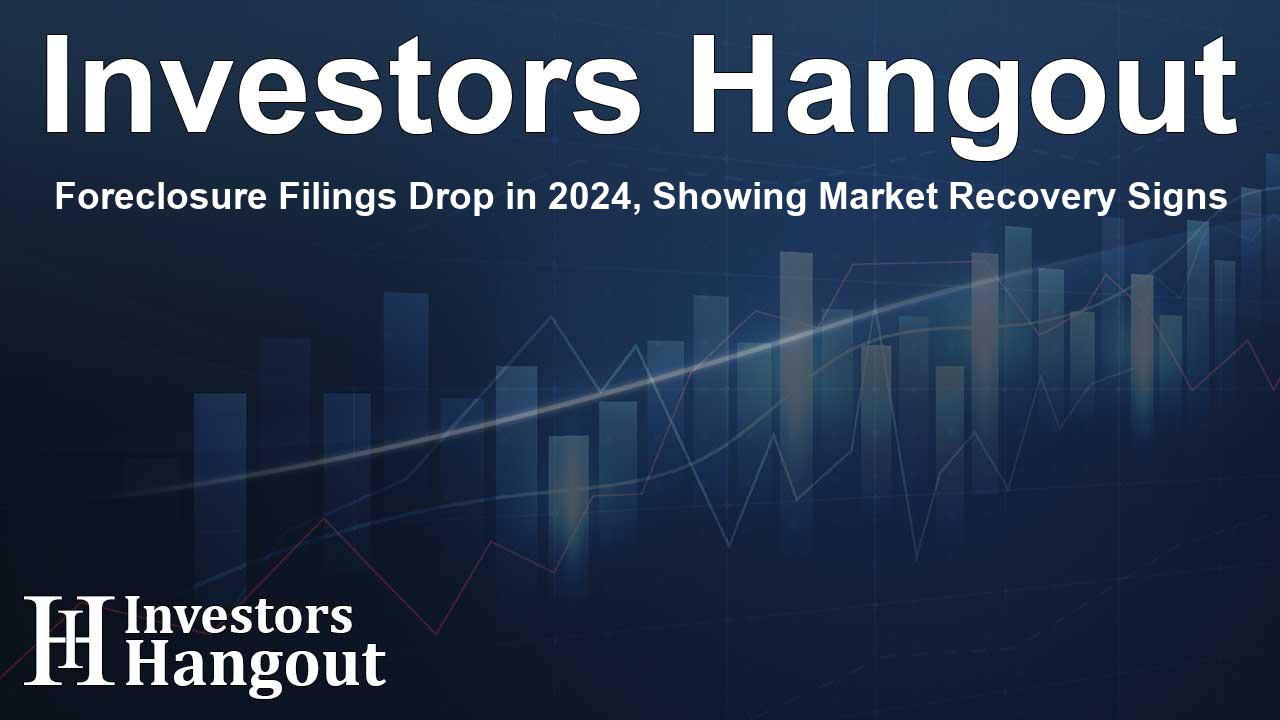Foreclosure Filings Drop in 2024, Showing Market Recovery Signs

Foreclosure Activity Declines in 2024
In a recent report released by ATTOM, it was revealed that the year 2024 saw a significant decrease in foreclosure activity across the United States. With a total of 322,103 properties facing foreclosure—a drop of 10 percent from the previous year—the data suggests that the housing market may be stabilizing following years of turbulence due to economic factors influenced by the pandemic.
Understanding Foreclosure Filing Trends
The reported foreclosure filings, which include default notices, scheduled auctions, and bank repossessions, represented just 0.23 percent of all housing units in the U.S. This number has gradually decreased from 0.25 percent in 2023 and is a far cry from the 2.23 percent peak experienced in 2010 during the housing crisis.
Rob Barber, CEO of ATTOM, stated, "The continued decline in foreclosure activity throughout 2024 suggests a housing market that may be stabilizing, even as economic uncertainties persist. This year's data points to foreclosure trends potentially returning to more predictable levels, offering some clarity for industry professionals, investors, and homeowners." This sentiment underscores the critical role of foreclosure metrics in assessing market health, contributing to a more balanced landscape shaped by prudent lending practices and resilient homeowners.
Quarterly Insights into Foreclosure Processes
Throughout 2024, lenders initiated the foreclosure process on 253,306 properties, marking a 6 percent decrease compared to 2023. This figure still represents a notable 174 percent increase since 2021, indicating a fluctuating landscape. The states with the highest number of foreclosure starts included California, Florida, and Texas, showcasing areas still grappling with the aftereffects of previous market conditions.
Among the largest metropolitan areas, places like New York, Chicago, and Houston reported significant foreclosure starts, showing that even within larger populations, challenges remain prevalent.
Year-End Analysis of Repossessions
The report also highlighted a continuation in the decline of bank repossessions, with lenders reclaiming 36,505 properties through foreclosures in 2024. This marked a 13 percent decrease compared to 2023 and emphasized a 75 percent reduction from the peak in 2010. States like California, Illinois, and Pennsylvania reported the most repossessions, indicating areas where financial strain still affects housing stability.
For metropolitan statistical areas, Chicago and New York reported the highest number of REOs, pointing to ongoing challenges that need addressing to stabilize housing markets in densely populated regions.
Identifying Foreclosure Rates Across States
As of 2024, Florida, New Jersey, and Nevada stood out with the highest foreclosure rates nationwide, indicating a need for targeted interventions to assist affected homeowners. Statistically, one in every 267 housing units in these states faced a foreclosure filing, highlighting significant economic pressure on homeowners in these regions.
Additional states like Connecticut and Ohio also made the list of areas with elevated foreclosure rates, further emphasizing the widespread nature of the issue across the country.
Metro-Level Foreclosure Insights
Among metropolitan areas with large populations, Lakeland and Atlantic City faced the highest foreclosure rates in 2024. It’s crucial for city leaders and policymakers to evaluate these statistics, considering potential support programs to alleviate the pressures leading to such filings. Larger cities like Orlando and Jacksonville are also experiencing notable filings, suggesting an urgent need for solutions.
Time Taken for Foreclosure Processes
The average duration for foreclosure proceedings slowed slightly in the fourth quarter of 2024, averaging 762 days, which signifies a 6 percent decrease from the prior quarter. However, this marked a year-on-year increase, hinting at the complexities involved in navigating long-standing foreclosures, particularly in states with lengthy legal requirements.
States such as Louisiana and Hawaii reported the longest average times to finalize foreclosures, emphasizing the varying demands of regional laws affecting property recovery processes.
Frequently Asked Questions
What are foreclosure filings?
Foreclosure filings indicate the legal process where a lender asks the court to take back a property due to unpaid loans. This can involve default notices, scheduled auctions, and bank repossessions.
How much did foreclosure activity decrease in 2024?
Foreclosure activity decreased by 10 percent in 2024 compared to the previous year, indicating a potential stabilization in the housing market.
Which states had the highest foreclosure rates in 2024?
Florida, New Jersey, and Nevada had the highest foreclosure rates, each experiencing a high number of housing units facing filings.
What does a decrease in repo rate signify?
A decrease in the rate of repossessions suggests an improvement in housing stability, as fewer homes are being reclaimed by lenders.
How long does the foreclosure process take?
In the fourth quarter of 2024, the average foreclosure process took 762 days, showing minor fluctuations in time based on legal and market conditions.
About Investors Hangout
Investors Hangout is a leading online stock forum for financial discussion and learning, offering a wide range of free tools and resources. It draws in traders of all levels, who exchange market knowledge, investigate trading tactics, and keep an eye on industry developments in real time. Featuring financial articles, stock message boards, quotes, charts, company profiles, and live news updates. Through cooperative learning and a wealth of informational resources, it helps users from novices creating their first portfolios to experts honing their techniques. Join Investors Hangout today: https://investorshangout.com/
Disclaimer: The content of this article is solely for general informational purposes only; it does not represent legal, financial, or investment advice. Investors Hangout does not offer financial advice; the author is not a licensed financial advisor. Consult a qualified advisor before making any financial or investment decisions based on this article. The author's interpretation of publicly available data presented here; as a result, they should not be taken as advice to purchase, sell, or hold any securities mentioned or any other investments. If any of the material offered here is inaccurate, please contact us for corrections.